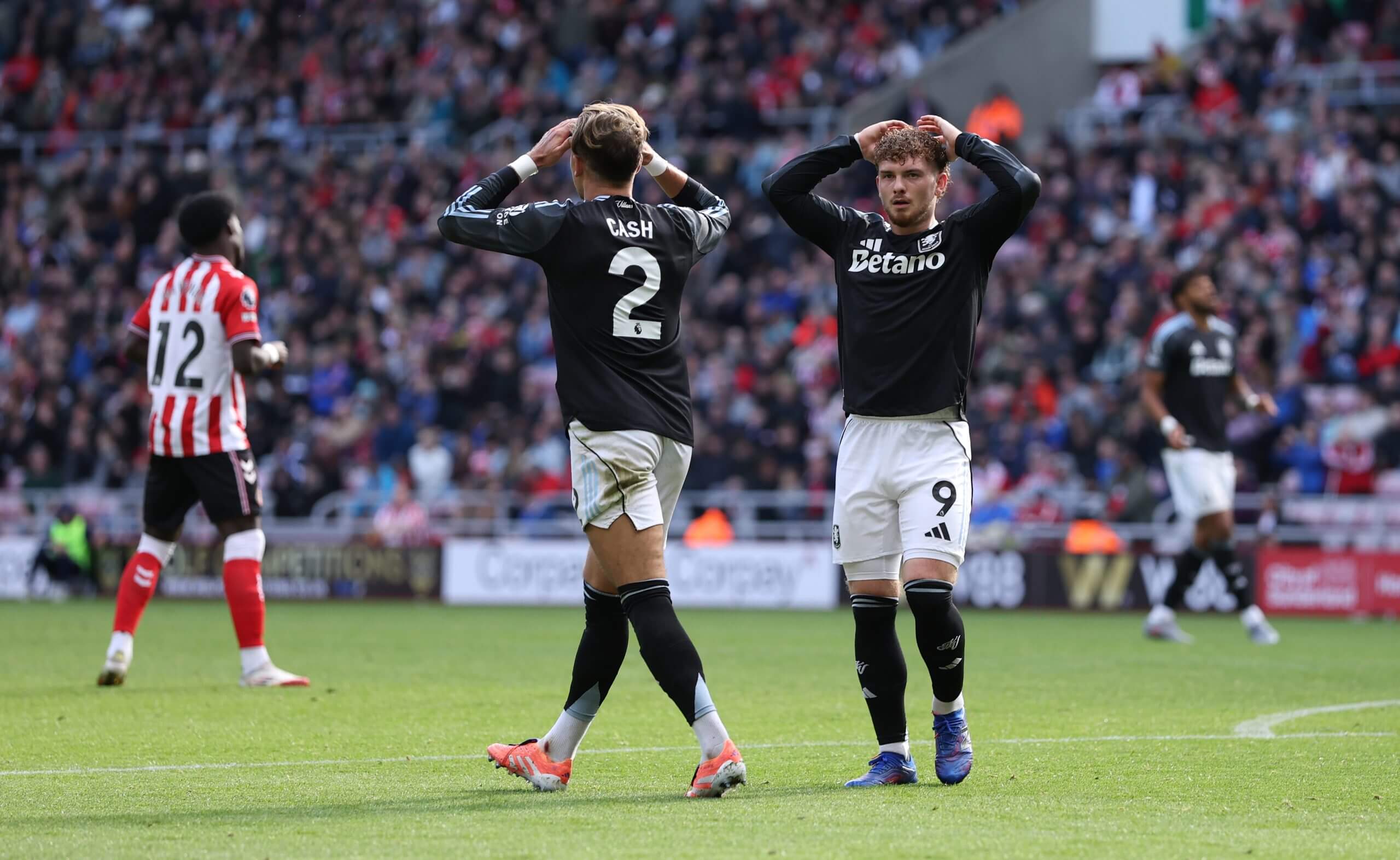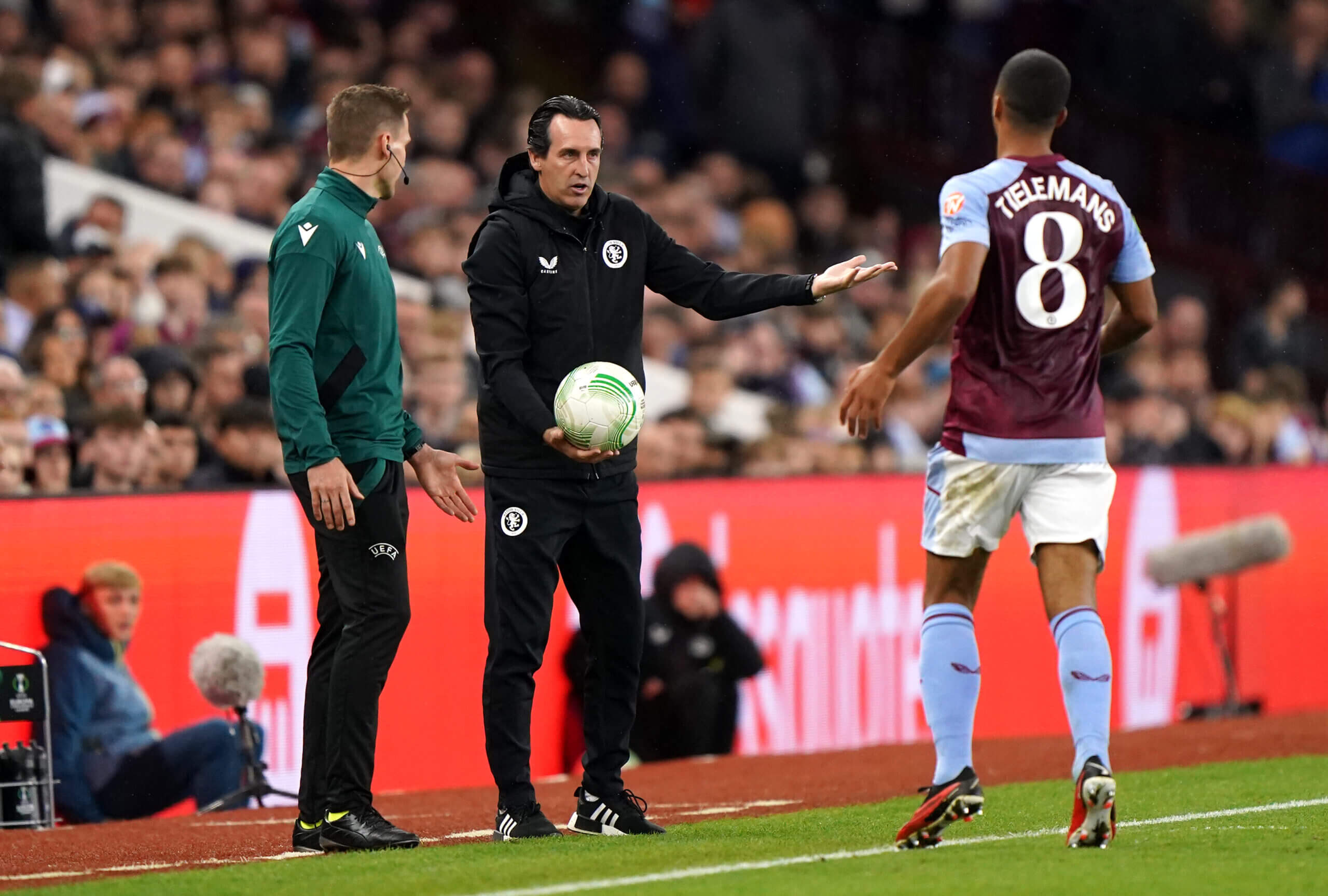There was one particular pass that stuck in the mind.
Aston Villa were level with 10-man Sunderland, but chasing the game. It had been nearly an hour since Reinildo’s red card, yet Villa were at risk of leaving with just a point and continuing their miserable start to the campaign.
A desperation began to take hold, opposing Unai Emery’s stringent methodology. Villa were shooting towards their away supporters, who were demanding that the ball be put forward quickly. And Harvey Elliott duly did so.
Receiving in the centre of the pitch before shifting the ball onto his left and towards that side, Elliott attempted an ambitious pass out to the flank that went out of play.
It was a typically bustling action from a player who has grown accustomed to being impactful off the bench and, particularly under Jurgen Klopp at Liverpool, progressing the ball upfield at high tempo.
Emery, though, reacted angrily. He turned around, throwing his hands up in the air. The frustration that had been simmering throughout a dreadful collective display reached combustion levels. He returned to the touchline to shout at Elliott, furiously gesturing for shorter, slower passes; the type he applauds Boubacar Kamara for, while supporters can groan.

Harvey Elliott and his team-mates toiled with limited success at Sunderland (Stu Forster/Getty Images)
There were five more minutes left to play — in Emery’s view, sufficient time to attack with greater structure, moving slowly with numbers upfield. Elliott may have been given, quite jarringly, the No 9 shirt, but Emery did not want him to be rushing into the box.
Emery was irritable at full time. He hurtled from one interview to another, calling his side “lazy” in two separate conversations, with very few, if any, staff able to settle him down. He arrived for his final interview in front of the written media and, having repeated lazy accusations, he singled out Elliott.
“Some players need adaptation,” Emery said. “For example, Harvey Elliott, a little bit he was getting the ball and so quickly doing passes behind the defence without options. He needs to understand, ‘OK, Harvey, you have skills to play more passes, more passes, more passes, and then to do the pass behind, outside or inside’, in better positions to get something more.”
To isolate Elliott was peculiar. He had been on the pitch for just 32 minutes. Aside from that one misplaced pass, he had done little wrong. Team-mates who had started the match were entitled to a greater share of the blame.
Elliott insisted he “took no offence” to Emery’s remarks, which, according to Villa staff, is illustrative of the 22-year-old’s mentality — he can take criticism and channel it appropriately.
The following week, Emery selected Elliott for the home fixture against Fulham, only to hook him at half-time for Emiliano Buendia. Emery was ultimately vindicated as Buendia scored and assisted as Villa won 3-1.
In the game, Elliott operated as the right ‘No 10’ (attacking midfielder), passing neatly and playing well in a first half that only offered promise in spurts. Understandably, however, Buendia held a better understanding of that position.
“I changed him tactically because Buendia is giving us energy and his adaptation is better than Elliott’s,” said Emery. “He needs time, Elliott. Emiliano did fantastic.”
The players Villa ended up with at the end of the window were not necessarily first choices, with Elliott the case in point.
Emery had pushed for West Ham United’s Lucas Paqueta ahead of the eventual deadline-day signing. Villa had known Elliott was available in the months before, yet the price caused hesitation. Initial discussions suggested that Liverpool wanted a higher fee, which was likely outside Villa’s financial reach, while other European clubs, including RB Leipzig, were actively pursuing him.
Villa had taken note of Elliott’s performances for England in their triumphant European Under-21 Championship and how he led from the front. He is a young, dynamic midfielder in an ageing squad, could hold resale value and positionally multi-faceted, one of Emery’s key preferences. In that sense, he appeared to be a safe investment.
Villa completed Elliott’s acquisition on an initial season-long loan, with a conditional obligation to make the transfer permanent next summer, dependent on Elliott making 10 appearances during the 2025-26 campaign. Liverpool sources indicated that the deal is worth around £35million ($46.8m), with Villa sources suggesting it is closer to £30m.
Recruitment staff believed his signing to be a coup, despite the negative internal atmosphere from tensions that had developed throughout the summer between Monchi and Emery. By the time Elliott arrived, Villa’s sporting director and manager were showing a clear separation. The tumult of the window and the team’s start to the season exacerbated the mood.
For his part, Elliott has impressed Villa personnel with his attitude and application, which chimes with Emery’s coaching staff’s uber-meticulous professional standards.
“He is a good lad, with a good head on young shoulders,” said one staff member, speaking anonymously as they are not authorised to comment.
After his debut away to Everton in September, where he came on as a second-half substitute, Elliott went out of his way to shake hands and introduce himself to journalists. He was keen to speak publicly and directly to Villa supporters.
“There are a few (positions) the manager said he wants to play,” the midfielder said. “It’s about finding the spaces where I can find the ball and, most importantly, bringing the forward players involved. Everyone has been so welcoming. The way they’ve looked after me — the team-mates, coaching staff and fans — have made me one of their own instantly.
“The first time I ever spoke to the manager, I was blown away by the way he was and what he had to say about me. His commitment to football, his energy, his passion and his detail as well.”
The clash occurs more so on the stylistic side and acclimatising to Villa’s methods. He is not the first signing to initially struggle with this, particularly as a midfielder. Youri Tielemans did not start a league fixture for three months while he became attuned to Emery’s nuances. How Tielemans overcame early toils is often used as a source of encouragement by new additions who seem peripheral at first.

Tielemans’ slow adjustment might be a case in point for Elliott (Tim Goode/PA Images via Getty Images)
Elliott has been an unused substitute in three matches and, since the Fulham game at the end of September, has played just four minutes (as a substitute in the Europa League win against Feyenoord).
Elliott’s introduction to life in the Midlands has been slow-going, broadly due to circumstances beyond his control. He entered into a tough situation and atmosphere, with the results on the pitch flatlining.
Now the situation is the opposite: since coming off against Fulham, Villa have enjoyed an acute uptick in form. They are on a run of five straight wins. Suddenly, there is rampant competition for places between Emery’s No 10s.
Elliott requires a period of adaptation. Attacking midfielders are critical to Villa’s build-up — no team attacks centrally more since Emery’s arrival — meaning they need to learn the complexities of the role. This can range from where to stand to create passing lanes to how quickly or slowly to travel in possession — as Elliott harshly discovered against Sunderland.
Without the ball, No 10s must be tactically erudite, recognising pressing triggers set by the striker. This would not be too dissimilar to how Elliott worked under Klopp.
But Emery’s words about passing too quickly do bear resonance. Plainly, he wants classical jazz from his attacking midfielders, rather than the heavy metal football Elliott has learned.
Patience will be afforded from all sides, yet the danger is that the longer Elliott goes without playing, the more questions will be asked about the decision to sign him and the further away the threshold will seem for his move to become a permanent one.

